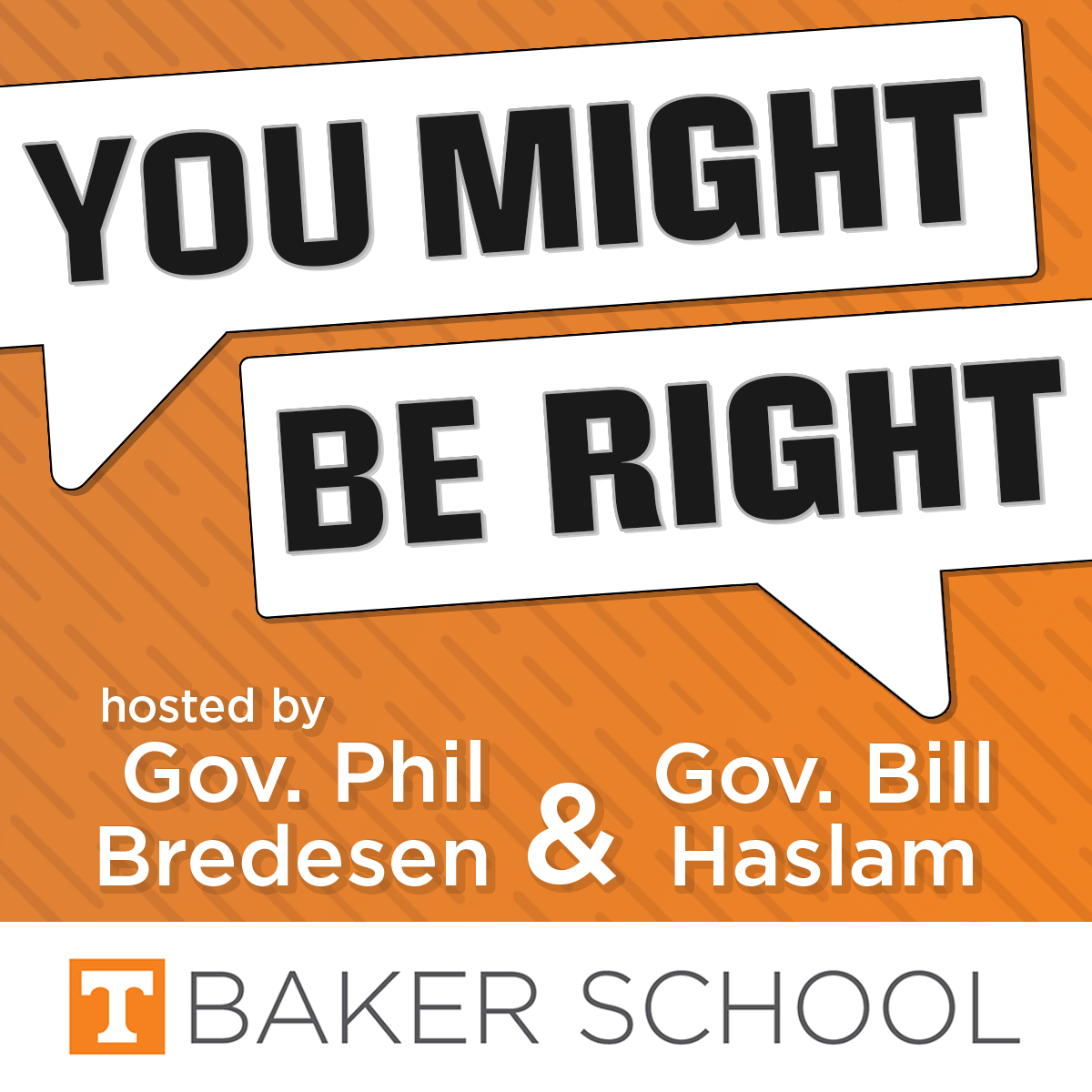Can government work better and cost less?
Debates over both the role and size of government are as old as the country. Over time, presidents from both parties have attempted to streamline government, cut spending, and improve service delivery to varied degrees of success. In this episode, our hosts, former Tennessee Governors Phil Bredesen and Bill Haslam, and their guests, Elaine Kamarck, Senior Fellow in Governance Studies and Director of the Center for Effective Public Management at the Brookings Institution, and Jim Capretta, Senior Fellow and Milton Friedman Chair at the American Enterprise Institute, discuss what a smaller, more efficient government might look like – and if it’s possible to get there. What can we learn from history about both the legal and political challenges of cutting government programs facing the Trump Administration’s Department of Government Efficiency (DOGE)?
Subscribe and follow You Might be Right wherever you get your audio content – including Apple Podcasts and Spotify – to never miss an episode, or sign up for our email list to receive new episodes straight to your inbox each week here.
“Government deals with life and death situations”
Both guests had been involved in efforts by previous presidential administrations to reform government – Kamarck led the National Partnership for Reinventing Government, launched by the Clinton Administration in the 1990s, and Capretta served as an associate director of the White House Office of Management and Budget in the George W. Bush Administration – and shared their perspective on how those efforts compare to DOGE’s approach.
The conversation quickly turned to limitations of the often-cited goal of running government like a business. The guests acknowledged certain business principles can be useful when the government oversees similar processes – for example, learning from Disney about line management, and how that could be applied to passport and social security offices – but warned the comparison has limits.
“Where the differences come in is in the end purpose – business doesn’t have to be stable in the way that government does,” Kamarck noted. “You take away people’s Medicare and they can’t get life-saving medicines. You take away people’s Social Security or screw it up and people can’t buy food or pay the rent…Government deals with life and death situations, and business simply doesn’t.”
Capretta generally agreed, noting the private sector operates in “a completely different way of thinking” from the government.
“I used to say government was the only place where if things are going badly, the agency will come in and say, ‘Well, we need more money.’ And then if things are going well, they come in and say, ‘We deserve more money,’” he explained. “So, it was always a one-way street. There was never an easy way to say, if it’s not working, let’s take the money away…If there’s a business unit that’s failing and losing money, you cut it loose, but you can’t really do that in the government, at least not for the really critical missions.”
“The problem is big spending programs”
How much of an impact will cutting the federal civilian workforce have on the deficit? “Its not going to make a dent…it’s symbolic,” Capretta said. “The problem is big spending programs, benefit programs going to the American public, and a mismatch between the costs of those programs and the taxes we’ve been willing to pay.”
Not every worthwhile effort to make government work better – such as reforming the FAA – will save money, Kamarck noted. “The only way you save money is you revamp the benefit programs, and nobody’s had the political guts to do that,” she said. One example she did point to as a potential path forward was the bipartisan 1983 social security reforms signed by President Reagan, where the major changes took place “so far in the future,” with little impact on current beneficiaries.
“There are ways this could be a breakthrough moment”
One area that both guests agreed an effort like DOGE could really make a difference: reforming the government’s information technology systems.
“Programming and IT investments in the federal government is not the government’s strong suit. There have been epic failures in the government on that score for decades,” Capretta said. “Having a unit that came in and said, ‘Let’s rework how the IRS does business, and think big, and we’re going to redo all of this IT in a big fundamental way.’ There’s nothing wrong with that. In fact, I think the public would love it…I think there are ways that this could be a breakthrough moment, but the destruction and disruption is making it hard to see how they get to that point.”
“[O]ne great good Elon Musk can do for the federal government is to bring some of these top-notch software engineers into the government to look at the legacy systems that are the information technology systems, which the government is never able to fix because we can never hire people at the salaries that you’re needed,” Kamarck added.
Subscribe and follow You Might be Right wherever you get your audio content – including Apple Podcasts and Spotify – to never miss an episode, or sign up for our email list to receive new episodes straight to your inbox each week here.

Join the conversation on Twitter by following @UTBakerSchool, @PhilBredesen, and @BillHaslam.


